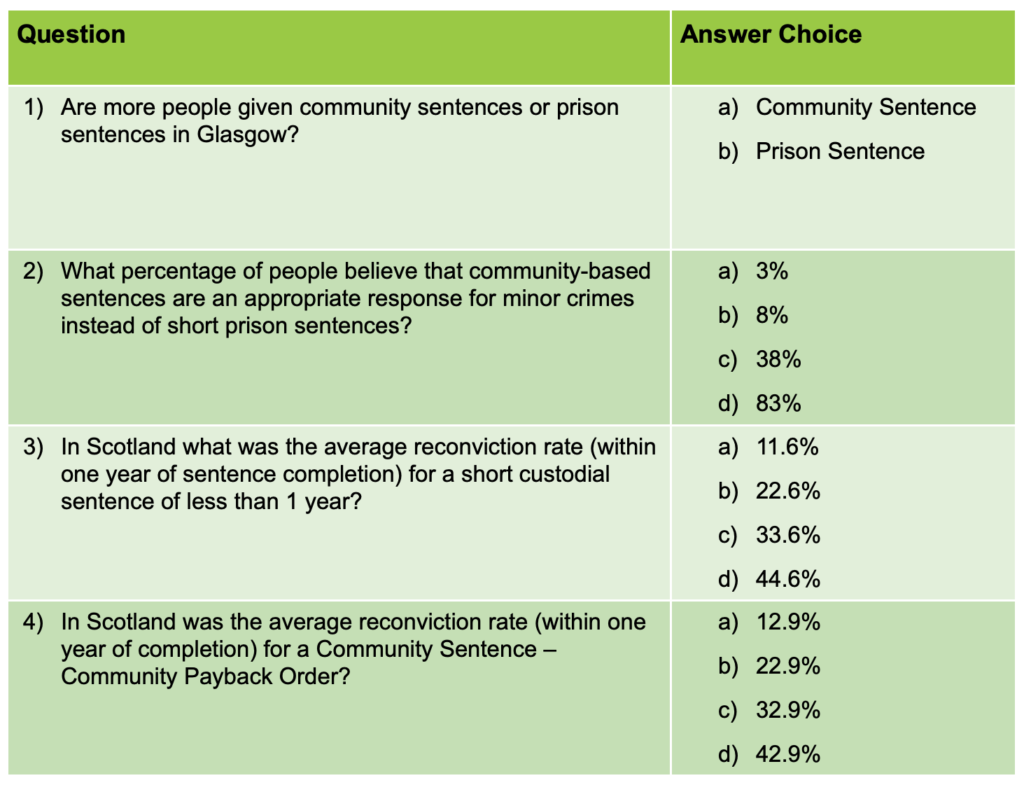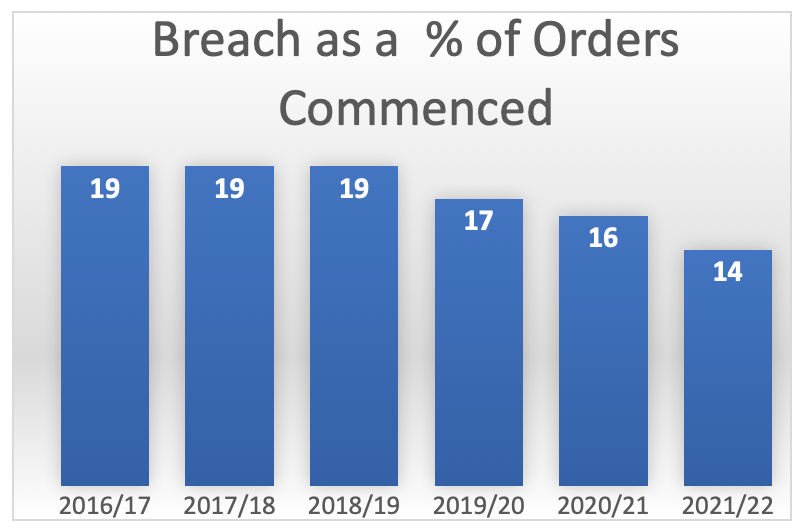Policy, Planning & Development Officer, Community Justice Glasgow
What comes into your head when you hear ‘Community Payback Order (CPO)’? One statement I often hear in the press and in conversation is that Community Sentences is a ‘soft option’ or the person ‘walked away scot-free’.
QUICK QUIZ – What do you think?

In this article, I am going to put forward the argument that a Community Payback Order holds individuals who are sentenced to account for the offences they have committed, whilst:
- presenting an opportunity to pay-back to the communities that have been harmed;
- addressing the issues that may have led people to commit crime in the first instance;
- linking people in with the structures and programmes that can put them on another pathway towards more pro-social behaviour;
- being more successful at reducing the risk that they will re-offend and cause further harm to individuals, communities, and wider society.
Firstly let’s explore what a Community Payback Order is – A Community Payback Order or CPO is a sentence served in the community rather than prison – by a person convicted of a crime in a court. CPOs are designed to ensure that those who commit offences pay their dues to the communities that they have harmed. Firstly, by requiring the person to make amends – often in the form of unpaid work and other activity, and secondly by requiring them to address any underlying problems that may be fuelling crime through imposing one or more of nine provisions or requirements available to sentencers.
Main features – it is a sentence used for low to medium level offences (that would normally attract a short-term prison sentence, likely less than 1 year), it is dealt with by the Court, it is a conviction and non-compliance (breach) may result in a custodial sentence. In Glasgow in 2021/22 (Note at time of publication 2022/23 figures were not available) 82% of Community Payback Orders were successfully completed with 14% not completed due to breach – an improving trend.

Requirements that can be imposed by sentencers include:
Unpaid Work & Other Activity (between 20 and 300 hours) – the Court will require the person to undertake a form of practical work as well as other activity that promotes desistence from offending and the work will have to be completed within a designated timeframe. In 2022/23, communities across Glasgow benefitted from 131,787 of unpaid work – that’s 2,534 hours per week or 362 hours per day – carried out by 1,969 individuals.
- Alcohol treatment – The Court requires the person to undertake treatment where there is an alcohol dependency identified as contributing to offending behaviour.
- Compensation – The Court requires the person to pay a sum of money to the victim(s) of their crime for damage, loss or personal injury.
- Conduct – The Court requires the person to do, or refrain from doing certain actions.
- Drug treatment – The Court requires the person to undertake treatment where drug dependency is identified as contributing to offending behaviour.
- Mental health treatment – The Court requires the person to undertake treatment (including care and support) where a diagnosed mental health condition and/or learning disability has been identified as contributing to offending behaviour.
- Supervision – The Court requires the person to attend appointments with a Criminal Justice Social Work Case Manager for a specified period of time.
- Programme – The Court requires the person to undertake a course or other planned set of activities, over a period of time.
- Residence – The Court requires the person to live at a certain address to reduce the likeliness of re-offending.
One of the key levers in reducing re-offending and areas of focus for the Community Justice Glasgow Partnership – and indeed Community Justice Partnerships across Scotland – is working in partnership with public and 3rd sector organisations, at strategic and service delivery levels, to improve the effectiveness of Community Sentences in reducing the risk that an individual will re-offend. The National Strategy for Community Justice sets out that Community Justice Partnerships should:
“Ensure that those given community sentences are supervised and supported appropriately to protect the public, promote desistence from offending and enable rehabilitation by delivering high quality, consistently available, trauma-informed services and programmes”
“Community justice is principally about organisations working together to ensure that people who have offended address the underlying causes of their behaviour and pay back to the community where appropriate. It aims to encourage rehabilitation, reduce reoffending, and protect the public, leading to fewer victims and safer communities.”
You can CLICK ON THE PICTURE LINK BELOW OR SCAN THE QR CODE to read the new National Strategy for Community Justice.
There are simply more opportunities in the community than in prison to support people to move away from offending behaviour. This is not because there is unwillingness in the Prison Service, there is lots of good work going on and you can read about some of that in the ‘SENTENCED – PRISON’ tab, however, well documented issues around staffing levels, availability of space, access, overcrowding etc. can all hinder the good will to address the needs that brought people into prison.
Short-term sentences can do further damage breaking links will support mechanisms, family, treatment or with programmes and services the individual may be engaging with. Short-term sentences can also lead to loss of tenancy, employment, family ties etc. – all known to be protective factors against further offending. Over a number of years, the Community Justice Glasgow Partnership has worked to increase the number, variety and depth of options available to those serving a Community Sentence that can have a positive impact on reducing the risk that they will re-offend
Don’t take my work for it though, CLICK THE VIDEO LINK BELOW to hear direct from Tracy about her experience of serving Community Payback Order and the difference it made to her life and direction of travel.
Reconviction data shows that Community Payback Orders are consistently more effective at reducing the likeliness that an individual we re-offend than a short-term prison sentence. Note that 2023 (2020/21 cohort data was not available at time of publishing)

For many the drivers of their offending will be trauma or Adverse Childhood Experiences (ACEs), you will hear Tracy in the video above, talk about her own personal trauma, alcohol misuse as the driver for her offending behaviour, you can also click on Yvonne’s story below where she talks about ending up in prison because of her deteriorating mental health and the need for support over punishment. If you would like a better understanding of these issues in a summarised format click on the links to the Hard Edges Summary Report and Scottish Governments summary explanation of Adverse Childhood Experiences or read more about this in previous articles – just CLICK ON THE LINKS BELOW.
For others that might be health issues such as poor mental health or drug and/or alcohol misuse (often linked to trauma and ACEs), it may be deprivation and lack of opportunity – sometimes leading to grooming by organised crime gangs, it can be financial difficulties from gambling addiction – I could go on, but I think you will be getting the picture. If we don’t support people to break the cycle of offending behaviour then they will (as much evidence supports) simply go around the revolving door, causing emotional and financial harm to themselves, other individuals, communities and society as a whole.
There is nothing Soft about a Community Payback Order, as well as presenting an opportunity to address the underlying drivers of offending behaviour and reduce the risk of further offending, there is an opportunity to payback through unpaid work, which benefits communities. This and our Previous Annual Reporters have many articles that demonstrate the benefits, you can CLICK THE PICTURE LINK or SCAN THE QR CODE below to read just one example:
For a commentary on the question of punishment or rehabilitation you can read one of my previous articles ‘Punishment or Rehabilitation – Balancing the Scales of the Justice System’ which looks at both sides of the scales – on the one hand that people should be held to account by means of prison as a punishment for their offending and on the other the argument that in reality a rehabilitative approach, providing the support that people need to become more positive citizens and contributors to society delivers better outcomes for all.
QUIZ ANSWERS – How did you do?
Q1 – Answer a) Community Sentence
(Of those convicted in 2021/22, 2417 were given a custodial sentence and 3,605 were given a community sentence) – this has consistently the case
Q2 – Answer d) 83%
Q3 – Answer c) 33.6%
Q4 – Answer b) 22.9%










